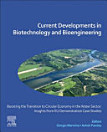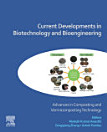Current Developments in Bioengineering and Biotechnology: Advances in Eco-friendly and Sustainable Technologies for the Treatment of Textile Wastewater
eBook 정보
- Introduces the global scenario of textile pollution, including country-wide industrial contribution, severity, and ecological consequences
- Covers both conventional treatment technologies for the removal of synthetic dyes, such as adsorption and coagulation, along with several novel approaches of advanced treatment options, including photocatalysis and advanced oxidation processes
- Provides an in-depth analysis of bioremedial approaches, including the application of bacterial, fungal/yeast, microalgae and plants, and enzymatic biotransformation for the degradative metabolism of dyes
- Includes genetic engineering, metagenomics, microbial fuel cells, and biofilm-based immobilization techniques and bioreactors
저자 정보
Professor Ashok Pandey is currently Distinguished Scientist at the Centre for Innovation and Translational Research, CSIR-Indian Institute of Toxicology Research, Lucknow, India and Executive Director (Honorary) at the Centre for Energy and Environmental Sustainability – India. Formerly, he was Eminent Scientist at the Center of Innovative and Applied Bioprocessing, Mohali and Chief Scientist & Head of Biotechnology Division and Centre for Biofuels at CSIR’s National Institute for Interdisciplinary Science and Technology, Trivandrum. His major research and technological development interests are industrial & environmental biotechnology and energy biosciences, focusing on biomass to biofuels & chemicals, waste to wealth & energy, industrial enzymes, etc. Professor Pandey is Adjunct/Visiting Professor/Scientist in universities in France, Brazil, Canada, China, Korea, South Africa, and Switzerland and also in several universities several in India. He has ~1400 publications/communications, which include 16 patents, 87 books, >700 papers and book chapters, etc with h index of 102 and ~46,300 citations (Goggle scholar). He has transferred several technologies to industries and has done industrial consultancy for about a dozen projects for Indian/international industries. Professor Pandey is the recipient of many national and international awards and honours, which include Distinguished Scientist, VDGOOD Professional Association, India (2020); Distinguished Professor of Eminence with global impact in the area of Biotechnology, Precious Cornerstone University, Nigeria (2020), Highest Cited Researcher (Top 1% in the world), Clarivate Analytics, Web of Science (2019); IconSWM Life-time Achievement Award 2019, International Society for Solid Waste Management, KIIT, Bhubaneshwar, India (2019); Yonsei Outstanding Scholar, Yonsei University, Seoul, Korea (2019), Highest Cited Researcher (Top 1% in the world; Top 10 in India), Clarivate Analytics, Web of Science (2018); Life-Time Achievement Award from the Biotech Research Society, India (2018); Life-Time Achievement Award from Venus International Research Awards (2018), Most Outstanding Researcher Award from Career360 (2018), Life-Time Achievement Award from the International Society for Energy, Environment and Sustainability (2017); Academician of European Academy of Sciences and Arts, Austria (2015); Honorary Doctorate degree from Univesite Blaise Pascal, France (2007); Thomson Scientific India Citation Laureate Award, USA (2006); UNESCO Professor (2000); Raman Research Fellowship Award, CSIR (1995); GBF, Germany and CNRS, France Fellowships (1992) and Young Scientist Award (1989), etc. He is Fellow of various academies, which include Royal Society of Biology, UK (2016); International Society for Energy, Environment and Sustainability (2016); National Academy of Sciences, India (2012); Association of Microbiologists of India (2008), International Organization of Biotechnology and Bioengineering (2007) and the Biotech Research Society, India (2005). Professor Pandey is Founder President of the Biotech Research Society, India (www.brsi.in); Founder & International Coordinator of International Forum on Industrial Bioprocesses, France (www.ifibiop.org), Chairman of the International Society for Energy, Environment & Sustainability (www.isees.in), Editor-in-chief of Bioresource Technology (http://ees.elsevier.com/bite/), Honorary Executive Advisor of Journal of Energy and Environmental Sustainability (www.jees.in), Journal of Systems Microbiology and Biomanufacturing (https://www.springer.com/journal/43393), Journal of Environmental Sciences and Engineering (http://neerijese.org/editorial-board/), Subject Editor, Proceedings of National Academy of Sciences, India (https://www.springer.com/life+sciences/journal/40011) and Associate Editor, Biologia – Section Cellular and Molecular Biology (https://www.springer.com/journal/11756/editors) and editorial board member of several international and Indian journals
Professor Govindwar FISBT, FMASc, FBRS has done internationally acclaimed research in bioremediation and phytoremediation of textile effluent. Currently, he is the top-ranked in Scopus among all the global scientists working in the area of “decolorization. His remarkable research mainly pertains to the elucidation of enzymatic pathways for the degradation of toxic textile dyes to nontoxic metabolites using microbes, fungi, plants, and their interactions. He has demonstrated the involvement of oxidoreductase enzymes in the biotransformation of textile dyes using purified lignin peroxidase, polyphenol oxidase, and laccase enzymes from bacteria, fungi, and plants, and elucidated pathways and mechanism of textile dye degradation. He has developed laboratory scale phytoreactors, a wetland, and phyto-bed technology for efficient bioremediation of textile industry effluent and textile dye contaminated sites. He extended his research with phytoremediation of pharmaceutical contaminants from sewage wastewater. He has published 250+ research papers in refereed journals (Citations: 12366, h-index: 58 (Google Scholar) having average impact factor around 3.5) and book chapters. He was Joint Secretary, Maharashtra Academy of Sciences, Kolhapur Chapter, India. He is recognized as an Expertscape World Expert (top 0.1% of scholars) in Conservation of Natural Resources, Textiles, and Environmental Biodegradation over the past 10 years (2009-2019), Brain Pool Visiting Scientist from National Research Foundation, South Korea, and African Centre of Excellence in Water (ACE WATER), Nigeria (2019-2024) as a Member of International Scientific Advisory Board. His research work where he developed phytoreactors and extended his research from the laboratory to land has been appreciated by the Department of Biotechnology, Ministry of Science and Technology, New Delhi, India, and it was published by the Government of India in the “Bulletin of success stories achievements during 2014-2018.
Dr. Mayur Kurade earned his Ph.D. degree in 2012 from the Shivaji University, Kolhapur, India for his in-depth investigation on the biodegradation of xenobiotic synthetic dyes and bioremediation of textile industry wastewater using microbial catalysts. He has conducted his postdoctoral research during 2013-2014 in ARCPE lab at Hong Kong Baptist University, Hong Kong focusing on applied microbiology for sludge processing and wastewater treatment to upgrade the existing bioleaching methods of sewage sludge. Following this research profile, he joined Hanyang University, Seoul, South Korea in 2015 as Assistant Professor. He is frequently serving as Session Chair and co-organizer of the Geochemistry division in American Chemical Society National Meeting & Exposition, USA. Dr. Kurade has done world-class research in “Bioremediation and bioenergy. He is among the top 25 researchers in the world working in the area of dye decolorization according to Scopus. He has published >75 research articles in well-known peer-reviewed international journals of high repute along with 2 book chapters and 2 patents focusing on bioremediation and bioenergy with an average impact factor of 6.65, Citations of 2661 H Index of 31. Some of his research articles are appeared as “Highly cited articles in Web-of-Sciences. He is serving as an editorial board member for international journals including Frontiers in Microbiology, Environmental Technology, Energies, and Heliyon. Moreover, he is voluntarily contributing as a potential reviewer for top-class journals in Environmental Engineering and Biotechnology such as Water Research, Chemical Engineering Journal, Bioresource Technology, Journal of Hazardous Materials, and Environment International. Currently, at Hanyang University, he is exploring the bioremediation of emerging- organic pollutants from wastewater using microalgae and plants. He is also developing cost-effective technologies to improve biofuels/biogas yield using various organic sources to find a remedy for organic waste pollution. His specific research interests include biodegradation, bioremediation, environmental microbiology, bioenergy, and biofuels. His research outcomes and the developed technologies are helpful for the pollution control planning, management of water contamination, and environmental protection.
Professor Byong-Hun Jeon is a Professor and Director of Leaders in Industry-University Cooperation (LINC) at Hanyang University, South Korea. He holds BS degree in Mineral and Petroleum Engineering from Hanyang University, and earned both his MS and Ph. D. degrees at the Pennsylvania State University, USA. He is an active Chair of the Reviewers Board for the National Research Foundation of Korea, Ministry of Education, South Korea. Professor Jeon is also an Advisory Committee Member for SMTECH, South Korea. He is actively serving as an Editorial board member of several internationally acclaimed journals including Frontiers in Microbiology, Energies, and Geosystem Engineering. He is frequently acting as session Chair and co-organizer of Geochemistry division in American Chemical Society National Meeting & Exposition, USA. He has conducted world-leading research in Environmental Chemistry and Environmental Biotechnology. He has published more than 250 research articles in internationally acclaimed research journals including Nature communication, Energy and Environmental Science, Coordination Chemistry Reviews and Trends in Biotechnology, etc. Moreover, his applied research in environmental technology has fruitfully provided him over 25 patents and 3 technology transfers. His prolific research has attracted over 8000 citations to his articles. His current research interests include advanced biological wastewater treatment using microalgae and plants as ecofriendly bio-tools for the improved removal of nutrients and contaminants from wastewater. His research group is primarily investigating bioremediation and wastewater treatment with major emphasis on biodegradation and removal of organic micro-pollutants in wastewater using microbial tools. Specific interest has been on microalgal and plant removal of emerging contaminants such as pharmaceuticals and personal care products (PPCPs) and dyes. He has developed advanced wastewater treatment via coupling of microalgae cultivation for improved removal of N, P, and emerging organic contaminants from wastewater, and further utilization of microalgal biomass for bioenergy production. He is also investigating the co-digestion of wastewater sludge with high-strength organic waste for enhanced biogas production to develop an economically feasible process. He has established the coupling of the wastewater treatment system with bioenergy production for generating biofuel products using the recovered biomass from wastewater treatment. His specific research interests include biodegradation, fate and transport of environmental pollutants, aquatic ecotoxicology and ecology, environmental microbiology, and bioenergy.







